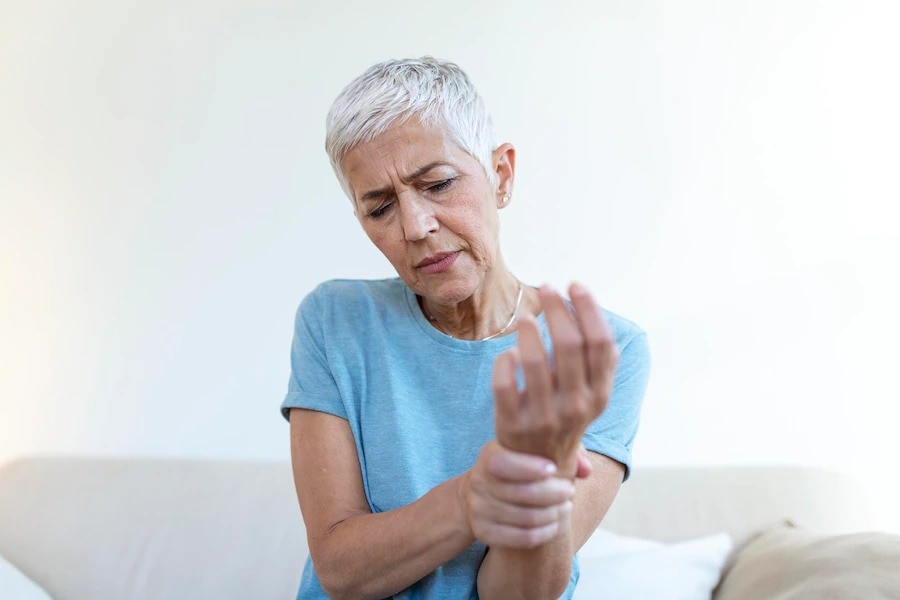Here are some simple remedies that can relieve arthritis pain during winters. Keep reading!
As we all know, arthritis is a joint condition that is inflammatory. Joint inflammation limits the range of motion of the affected joint. The onset of symptoms can be sudden or gradual, depending on the type and stage of the arthritis.
Winter is anything but a winter wonderland for people with arthritis. It is much more difficult to control arthritic pain in the winter. The sudden drop in barometric pressure caused by the change in ambient temperature causes the joints to expand. These conditions exacerbate the pain caused by various arthritic conditions.
“Yes, people with arthritis are the most affected by these cold waves. As the temperature drops, the capillaries narrow, causing stiffness, swollen joints, and tiredness. Also, your joints respond to a buildup of pro-inflammatory chemicals, complicating the situation,” said Dr. Rahul Grover, Consultant Orthopedic Surgeon, Founder and Director of Glyra Orthopedics, New Delhi.
Below are some helpful tips you can use to lessen the pain you feel in the winter.
1. The key to relieving joint pain is to stay warm.
It is obvious that staying indoors in an environment with adequate temperature control is the best method of preventing the cold. However, layering warm clothing made from quick-drying fabrics like wool is one of the best strategies for preventing cold-weather aches and pains if you must go outside. Wearing long underwear may also help keep your lower extremities warm if you have arthritis in your hips or knees. Keep your feet and hands warm too! Extra warm socks and a good pair of insulated gloves can help. You can also spend time in a warm bath if you come home with joint pain from the cold.
2. Stay active and preferably indoors
One of the best things you can do to prevent the discomfort of arthritis is exercise. Plus, it’s a fantastic approach to improving your overall well-being. Regular exercise helps increase muscle strength, flexibility, and energy levels, all of which can help decrease joint discomfort. Your joints will be less stressed with low-impact exercises. Great options include:
- Yoga
- Elliptical trainers or indoor cycling machines
- Aerobics
- strength training
- Walk or run on treadmills or padded indoor tracks
If you’ve never exercised before, Dr. Rahul Grover recommends that you start slowly. Start by exercising for about 2 to 10 minutes twice a day. Rest well between workouts. You can lengthen and intensify your workouts as you get used to your new activities.
3. Put on compression gear
For years, compression clothing such as sleeves, gloves, and socks have helped relieve joint pain. These things help stimulate circulation, which has been shown to ease the discomfort of arthritis. Compression clothing can trap heat, acting as an extra layer to keep your hands and legs warm during the harsh winter months.
4. Omega-3 Fatty Acids And Vitamin D May Reduce Arthritis Pain
The increased efficiency of calcium absorption caused by vitamin D promotes stronger bones. As a result, low vitamin D levels can make people more sensitive to the pain of arthritis. Normally, our food provides our bodies with a sufficient amount of vitamin D. The ultraviolet light we receive from sunlight helps our bodies make vitamin D. To ensure you get enough vitamin D during this time, monitor your intake of vitamin D as you go. cold weather can cause increased cloudiness and the desire to stay indoors.
To boost your intake, you can also take fish oil and vitamin D pills. In fact, a teaspoon of cod liver oil can meet all your daily vitamin D needs.”
5. Maintain a healthy weight
You will probably experience more pain the more stress you put on your joints. Your joints will experience less pain as a result of maintaining a healthy weight because you put less stress on them.
Brown adipose tissue, which emits pro-inflammatory chemicals that can damage joints, is more common in people with high body mass indexes (BMIs), according to studies. Additionally, inflammation can lead to autoimmune disorders such as rheumatoid and psoriatic arthritis. Additionally, obesity has been associated with an increase in cases of knee arthritis. The greatest strategies for maintaining a healthy weight are through a nutritious diet and an active lifestyle.
(With input from IANS)
